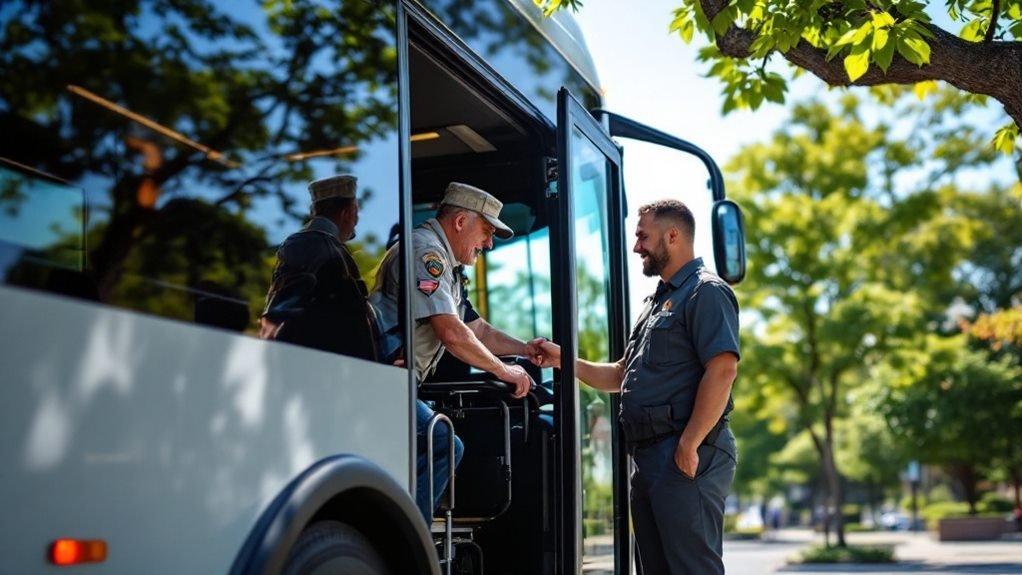You're probably wondering how long it takes to get a CDL in Florida. The timeline isn't set in stone, as it depends on several factors like your training completion, background checks, and the accuracy of your paperwork. While candidates often face a processing period of 7 to 10 business days after meeting all requirements, obtaining additional endorsements can extend this timeframe considerably. Curious about what each step entails and how you can navigate the process efficiently? Let's explore the essentials and potential hurdles you might encounter on your journey to becoming a commercial driver.
Key Takeaways
- Obtaining a CDL in Florida typically takes several weeks, including training, testing, and processing.
- Required training programs can take several weeks, with options for full-time or part-time schedules.
- Background checks may take from a few days to several weeks, depending on individual history.
- CDL processing times usually range from 7 to 10 business days after completing all requirements.
- Scheduling and completing both knowledge and skills tests are essential steps in the CDL acquisition process.
Eligibility Requirements
To frequently verify you're on the right track to obtaining a Commercial Driver's License (CDL) in Florida, it's vital to first understand the eligibility requirements. This foundational knowledge guarantees you approach the licensing process with confidence and avoid unnecessary setbacks.
Begin by confirming that you meet the age requirements: you must be at least 18 years old to drive intrastate (within Florida) and 21 years old for interstate driving (across state lines). By adhering to these guidelines, you align with safety standards that protect both yourself and others on the road.
Next, focus on residency verification. You need to prove you're a resident of Florida, which can be done by providing documents like a utility bill or lease agreement. This step confirms to the state that you're committed to operating within its regulations.
It's vital to have all your documentation in order before starting the application process to avoid delays. Verify your documents are current and accurately reflect your residency status.
Preparing thoroughly not only helps you, but also supports the community by maintaining a pool of responsible, well-qualified drivers. Remember, your diligence in meeting these requirements directly contributes to the safety and efficiency of Florida's roadways.
CDL Class Types
With the eligibility requirements understood, it's important to familiarize yourself with the different CDL class types available in Florida. This knowledge guarantees you choose the right path for your career goals and safety obligations.
There are three main classes: Class A, Class B, and Class C. Each comes with distinct responsibilities and training costs, which you'll need to evaluate carefully.
Class A CDL allows you to operate combination vehicles with a gross combination weight rating (GCWR) of 26,001 pounds or more, provided the towed vehicle exceeds 10,000 pounds. This class covers most large trucks, including tractor-trailers, and often requires the most thorough training, which can reflect in higher training costs.
Class B CDL permits you to drive single vehicles with a GCWR of 26,001 pounds or more, or tow vehicles not exceeding 10,000 pounds. Vehicles like buses and dump trucks fall under this category, and the training costs are generally moderate.
Class C CDL is for vehicles designed to transport 16 or more passengers (including the driver) or hazardous materials. The training costs can vary based on specific endorsements needed.
Understanding these class distinctions helps you align your skills with industry needs, prioritizing safety and service.
Medical Certification Process
Getting your Commercial Driver's License (CDL) in Florida involves rolling up your sleeves and tackling the medical certification process, an essential step to confirm you're physically fit for the demands of commercial driving. Your journey begins with a medical exam conducted by a certified medical examiner listed on the Federal Motor Carrier Safety Administration's (FMCSA) National Registry. This exam guarantees you're capable of safely operating a commercial vehicle without endangering yourself or others on the road.
During the medical exam, expect evaluations of your vision, hearing, blood pressure, and overall physical condition. The examiner will check for any health issues that might interfere with your ability to drive safely. It's important to disclose any medical conditions honestly, as concealing them could jeopardize your certification.
Once you've passed the exam, you'll receive a Medical Examiner's Certificate, an essential document in the certification process. Keep this certificate handy; you'll need it when applying for your CDL.
Background Check Duration
One vital step in obtaining your Commercial Driver's License (CDL) in Florida is undergoing a thorough background check, a process that guarantees the safety and security of everyone on the road. This step is significant, as it ascertains that only responsible individuals can operate commercial vehicles.
The duration of the background check can vary, but typically, it takes a few days to a couple of weeks. Several background check factors influence this timeframe. These factors include your criminal history, driving record, and any previous violations or infractions.
The depth of the investigation confirms that you're a safe candidate for a CDL. Any discrepancies or red flags could prolong the process, so it's important to be forthcoming and honest when providing your information.
There are also background check fees involved, which you'll need to take into account as part of the overall cost of obtaining your CDL. These fees cover the administrative work required to process your application and guarantee all necessary checks are completed.
CDL Permit Application
Starting the journey to obtain your CDL in Florida begins with the CDL permit application, an important step that sets the foundation for your commercial driving career. This process requires careful attention, as it's vital for guaranteeing safety and meeting legal requirements.
To start, gather the necessary documents required for your application. You'll need proof of identity, such as a birth certificate or passport, your Social Security card, and proof of Florida residency. Additionally, prepare a medical examiner's certificate, confirming you meet the physical requirements for commercial driving.
One of the permit application tips is to double-check that all your documents are current and match with regard to name and identifying details, as inconsistencies might delay the process. Note that you'll also need to pay a fee for the permit application, so verify the current fee structure on the Florida Department of Highway Safety and Motor Vehicles (FLHSMV) website.
To further guarantee a smooth application process, consider scheduling your appointment at the FLHSMV office in advance. This proactive step can save you time and help you avoid long wait times, allowing you to focus on serving others on the road soon.
Knowledge Test Preparation
Preparation is key when it comes to acing the CDL knowledge test in Florida. To guarantee you're ready, begin by mastering effective test study strategies. Start with the Florida CDL Handbook, which serves as your primary study guide. Break down the material into manageable sections and create a study schedule that allows for consistent daily review.
It's crucial to focus on understanding core concepts, such as vehicle inspection, safe driving practices, and transporting cargo securely.
In addition to the handbook, leverage practice test resources available online. These resources are invaluable for familiarizing yourself with the test format and types of questions you'll face. Take multiple practice tests to identify areas where you need further study. This repetition builds confidence and highlights your strengths and weaknesses.
While studying, prioritize your safety and the safety of others. Driving a commercial vehicle is a significant responsibility, and your knowledge directly impacts the well-being of those you serve. Keep this in mind as you prepare, and let it motivate you to thoroughly understand the material.
Skills Test Scheduling
After successfully preparing for the knowledge test, it's vital to move on to scheduling your skills test without unnecessary delay. This stage is significant as it evaluates your practical driving abilities and guarantees your readiness to operate a commercial vehicle safely.
In Florida, you have several test location options to choose from, including various Department of Motor Vehicles (DMV) offices and certified third-party testing sites. Selecting a convenient location can reduce travel stress and help you focus on performing your best.
When scheduling your skills test, consider the scheduling flexibility offered by different locations. Some sites may have more availability or extended hours, which can be particularly helpful if you're balancing other commitments.
It's advisable to book your appointment early to secure a time that suits your schedule. Make sure to prepare all necessary documents and fees ahead of your appointment to avoid any last-minute issues.
Your focus should always be on safety and readiness, guaranteeing that you're fully prepared to demonstrate your driving skills.
Required Training Programs
Once you've scheduled your skills test, it's important to focus on the required training programs that will sharpen your driving abilities and guarantee compliance with Florida's CDL standards.
These programs are essential, not only for passing the exam but also for ensuring the safety of everyone on the road. You'll find various training program options tailored to different needs and schedules. Some programs offer thorough classroom instruction combined with hands-on driving experience, while others focus on specific skills such as vehicle inspection or cargo handling.
When selecting a program, consider the program completion times, which can vary greatly. Full-time courses might take several weeks, providing an immersive learning experience.
Part-time or weekend classes offer more flexibility, ideal if you're balancing other responsibilities. Regardless of the option you choose, these programs emphasize the critical knowledge and skills required for safe and efficient commercial driving.
Endorsement Acquisition Time
When it comes to obtaining endorsements for your Florida CDL, understanding the time commitment is essential. Endorsements expand your driving capabilities, allowing you to qualify for specialized tasks, which ultimately increases your ability to serve others effectively and safely.
The time it takes to acquire endorsements depends on the endorsement types you're pursuing. Common endorsements include H (Hazardous Materials), P (Passenger), and N (Tank Vehicle). Each requires additional training and testing to guarantee you're well-prepared for the responsibilities they entail.
To acquire these endorsements, you'll need to allocate time for study and practice. For example, the Hazardous Materials endorsement requires you to undergo a background check, which can take a few weeks.
The Passenger and Tank Vehicle endorsements typically involve classroom instruction followed by skills testing. You should anticipate spending at least a few days to a week on each, depending on your learning pace and the scheduling of tests.
The endorsement benefits are substantial, providing you the expertise to handle more diverse tasks safely. This not only enhances your professional profile but also guarantees you're contributing effectively to the safety and well-being of everyone on the road.
License Issuance Timeline
Obtaining your CDL in Florida involves a clear understanding of the license issuance timeline, which is vital for effective planning. Once you've completed your training and passed the necessary tests, you'll want to know how long it takes to actually receive your CDL.
Typically, CDL processing times in Florida can vary, but most candidates receive their license within 7 to 10 business days after all requirements are met. It's essential to guarantee all documents are correctly submitted to avoid any delays.
Your focus on serving others through safe and efficient driving starts with being well-prepared. Double-check your application for accuracy, as errors can extend CDL processing times unnecessarily.
If you anticipate needing a renewal soon, it's wise to take into account the license renewal duration, which generally takes about the same time as initial issuance. Planning ahead minimizes downtime and keeps you on the road.
Stay proactive by tracking your application status online or contacting the Florida Department of Highway Safety and Motor Vehicles if you suspect any issues.
With proper planning and attention to detail, you'll navigate the issuance process smoothly, guaranteeing you're ready to serve your community safely.
Conclusion
In Florida, getting your CDL can take several weeks, depending on various factors. For instance, if you quickly complete your medical exam and pass the knowledge test on the first try, you might move through the process faster. However, if you need a hazardous materials endorsement, plan for additional time due to background checks. Remember, patience and preparation guarantee safety and success on the road, so follow each step diligently to get your CDL efficiently and safely.



